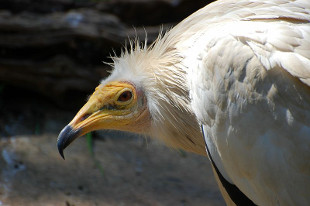 FLICKR, STEVEN SNODGRASSAfrica has 11 vulture species, of which seven are headed for extinction, according to an assessment released this week (October 29) by BirdLife International, in partnership with the International Union for Conservation of Nature (IUCN). The work is part of a larger effort to catalog the statuses of bird species worldwide.
FLICKR, STEVEN SNODGRASSAfrica has 11 vulture species, of which seven are headed for extinction, according to an assessment released this week (October 29) by BirdLife International, in partnership with the International Union for Conservation of Nature (IUCN). The work is part of a larger effort to catalog the statuses of bird species worldwide.
Six of the vulture species from Africa have been updated to either “endangered” or “critically endangered” status on the IUCN Red List. These are the hooded vulture (Necrosyrtes monachus), white-backed vulture (Gyps africanus), white-headed vulture (Trigonoceps occipitalis), Rüppell's vulture (G. rueppellii), cape vulture (G. coprotheres), and the lappet-faced vulture (Torgos tracheliotos). Another species, the Egyptian vulture (Neophron percnopterus), was classified as endangered in 2007.
“Vultures and other birds play a critical role in maintaining healthy ecosystems,” said Simon Stuart, chair of the IUCN Species Survival Commission, in a news release. “Their decline can have serious knock-on effects on other species and the many benefits provided by nature.”
The three main causes driving the vulture population declines appear to be: poisoning as collateral damage from efforts ...













